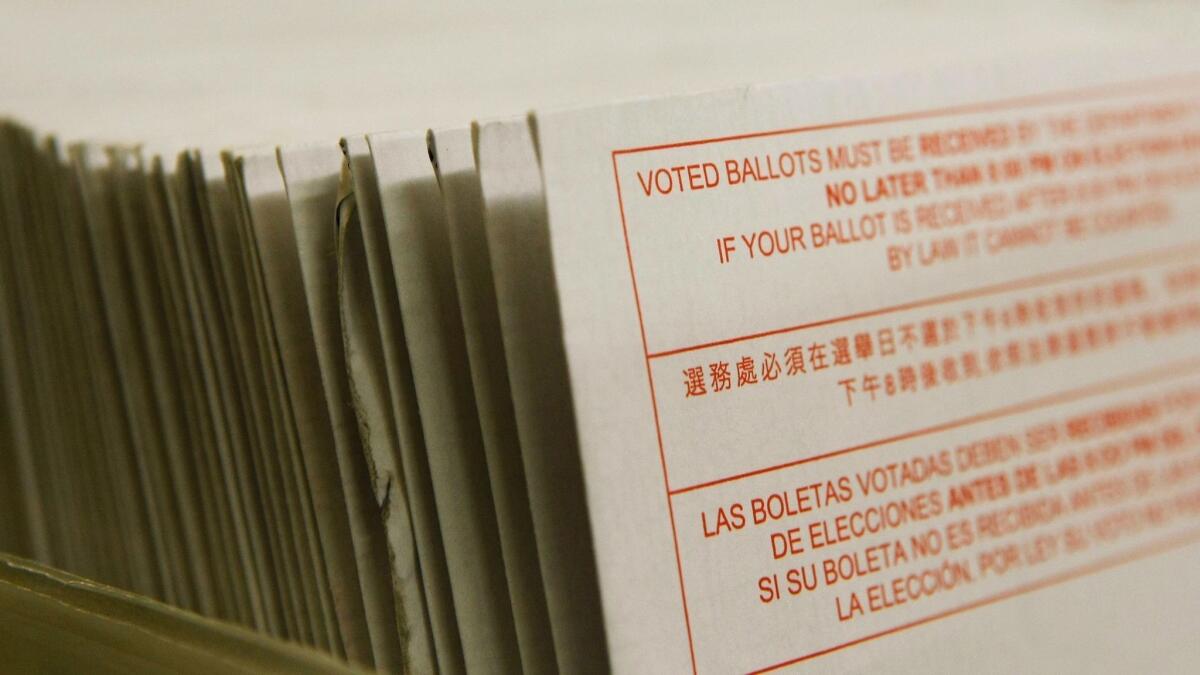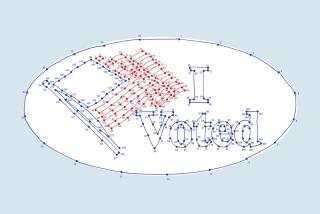Are you an independent voter? You can’t vote in the California GOP primary

- Share via
SACRAMENTO — As election day approaches, social media posts warn of a nefarious plot to limit who can vote in California‘s Republican presidential primary.
But the message is false: The only limit on participation is one imposed by the GOP‘s state and national leaders.
Their decision bans California’s 5.4 million so-called “independent” voters from casting primary ballots for President Trump or any of his six challengers in the March 3 statewide election.
“This is a self-inflicted wound,” said George Andrews, a GOP campaign organizer. “We can’t be the kind of Republicans anymore [who] exclude people.”
The move by Republicans stands in contrast to a decision made by Democrats to allow Californians registered as having “no party preference” to vote for any of the party’s 20 presidential hopefuls whose names will appear on the ballot. Confusion over the different rules has increased as local elections officials begin sending out mailers to unaffiliated voters explaining how to vote in the primary for president — mailers that don’t include the Republican Party as one of the choices.
Andrews, a legislative staffer who also works on GOP campaigns, recently complained on Twitter about what he believes is a failure by GOP leaders to embrace the changing habits of voters who may focus more on particular candidates and policies than party membership.
“We’re throwing away Republican votes,” he said in an interview. “We’ll just continue to shrink and shrink.”
A statewide survey conducted in November by the nonpartisan Public Policy Institute of California found a limited but noticeable number of unaffiliated voters receptive to the GOP message. Twenty-five percent of independent voters polled said they have a favorable view of the Republican Party; among those likely to vote, the number rose to 34%.
Jessica Millan Patterson, the chairwoman of the California Republican Party, rejected the idea that a closed presidential primary has a negative effect on a voter’s perception of the GOP.
“Our party believes our nominee should be chosen by Republicans,” she said. “We are trying really hard to build a California Republican Party that everyone feels welcome in.”
Patterson said a key challenge is that each county’s GOP leadership is chosen during a presidential primary. Allowing non-Republicans to help choose those leaders, she said, would be a problem. So too would be changing election rules to split local leadership races from the GOP presidential primary.
“It would be an incredibly expensive endeavor,” she said.
Republicans are not alone in segregating their presidential primary from California’s open-to-everyone races for Congress and the Legislature. The question of whether to allow unaffiliated voters to cast presidential votes has divided the state’s six political parties into two equal-sized camps. Democrats, Libertarians and American Independents have an open primary for president; Republican, Green and Peace and Freedom party leaders have kept their primaries closed to all but registered members.
Democrats have used the California GOP’s decision to keep its presidential primary closed as a talking point in their effort to brand themselves as members of a party of inclusion — one whose elected officials have crafted a series of changes to the law designed to boost voter registration and increase the amount of time to vote and count ballots.
“Republicans might be saying, ‘Commit to our party.’ But Democrats would say, ‘Commit to our democracy,’” said Rusty Hicks, chairman of the California Democratic Party. “Something as simple as allowing no-party preference voters to participate in our primary is in line with that direction.”
Rules vary by state when it comes to presidential primary access for voters who are not registered with a political party. Republicans in several states that will hold their presidential primaries on March 3 are allowing unaffiliated voters to participate. Should California GOP leaders change their minds for the 2024 presidential election, they would need the approval of state party members and the Republican National Committee.
Perhaps no trend has dominated California politics more over the past decade than the growing ranks of unaffiliated, independent voters. There are more than twice the number of nonparty voters now as there were in January 2008. Taken as a group, they outnumber Republicans and are second only to Democrats. In 2016, no party preference voters played a sizable role in the state’s Democratic presidential primary — though there were some reports that independent voters found the procedures to cast a ballot confusing.
This time, the process could be easier under a new state law that allows voters to change their registration status or register for the first time on election day. And to limit confusion, election officials are reminding unaffiliated voters by mail that they must proactively request a “crossover” ballot from one of the three parties that have open presidential primaries.
It’s that piece of mail, which doesn’t list the Republican Party, that is falsely being portrayed on social media as evidence of an anti-GOP campaign.
Andrews, who said the mailed out cards are a painful reminder that his party might be missing out on an opportunity to connect with like-minded independent voters, said he realizes some GOP officials won’t be happy with him speaking up.
“I’ve been getting text messages saying, ‘You sure you want to pick a fight with them?’,” he said of party leaders. “But if I don’t pick a fight with these guys, I won’t even have a Republican Party in California to fight for in 10 years.”
More to Read
Sign up for Essential California
The most important California stories and recommendations in your inbox every morning.
You may occasionally receive promotional content from the Los Angeles Times.











